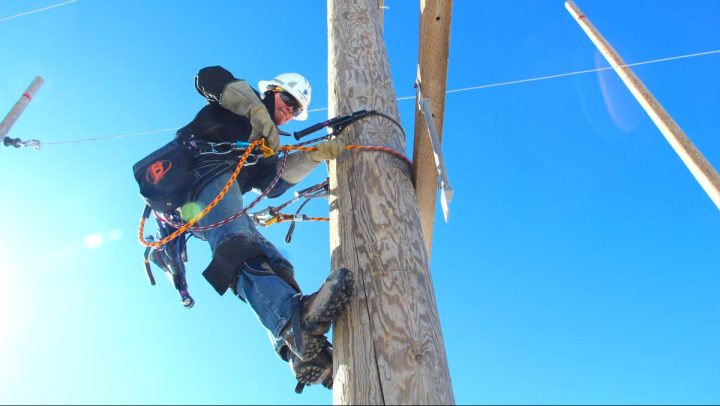
Wyoming school is training students for a new energy future
Wyoming school is training students for a new energy future

On a recent windy, subzero day at Western Wyoming Community College in Rock Springs, seven students are climbing four-story-tall wooden poles in the sprawling sagebrush behind the campus. Their metal, spiked shoes dig into the poles as they muscle their way to the top.
It is part of a new power-line program at the school — the first one in the state. Their teacher, Lance Caldwell, gave them tips.
“Guys, don’t forget on your way down, lock the knee before it goes into the pole, not after,” he said.
Rock Springs, a small city in southwest Wyoming. has long been tied to energy. And the energy landscape in southwest Wyoming is changing. Oil and gas production has slowed and coal plants are closing.
At the site of one coal plant nearing its end, a nuclear facility is scheduled to open. It is being built by TerraPower, a company co-founded by Bill Gates. If it proves successful, the state’s main utility company, PacifiCorp, will take over the facility by the early 2030s. And that plant will need workers. In fact, PacifiCorp is already trying to meet the growing demand of power workers in Wyoming, with 48 job openings in late March — some with $15,000 sign-on bonuses.
“They have a whole generation about my age that’s about to retire all at the same time,” Caldwell said. “And the market is going to be very, very short of training qualified people.”
So the college is shifting the types of programs it offers to prep students for what is to come.
Students who finish the power-line program can land an apprenticeship, and after that can expect to make about $200,000 a year.
Student Treyton Davenport will finish up the program this spring. But for now, he is learning how to stay safe.
“So we hit the pole, make sure it’s not rotted out and make sure it’s not going to fall on us. So you just tap it,” Davenport said as he hits the wooden pole with his hammer. “You can kind of listen to it, and you can know if it’s hollow or not.”

If it is hollow, you don’t climb it. This is dangerous work, but it is necessary to keep power flowing. The nuclear facility requires up to 2,000 workers to build and run it — including mechanics, welders, plant operators and power workers.
“We have the opportunity at the ground level, obviously, to kind of help shape what that workforce looks like,” said Amy Murphy, the college’s dean of workforce and outreach education. “What industry wants is our students to get the training here and stay in Wyoming.”
Murphy said the college is focusing on the jobs that are available. For a long time that meant coal, oil and gas. The college discontinued the oil and gas program in 2020. Notably, production at nearby natural gas fields has been declining since the boom in 2009.
“We were oil and gas for a long time — and it’s still out there — but everyone knows that green energy is kind of coming on hard,” said Jake Mannikko, the college’s welding instructor. “We might need to change our mindset a little bit and retool our tool bag, so to speak, to teach those industries, but we can do it.”
So now, much of the focus is on nuclear power. In fact, if the new plant is successful, five more could come to the region. Mannikko said welding can be tailored for many different types of energy, including nuclear. As the construction of the new plant kicks off this spring, Mannikko and his students will help with testing welds that will be needed to build the facility.
The power-line students also hope to play a role in the construction and development of the plant. Back outside, student Hagan Jones was on the ground, looking up at a pole he just climbed.

“When you’re moving, it’s not that bad,” Jones said. “Just when you stop and you can feel your pole rocking a little bit, it’s nerve-wracking.”
He said the first time he climbed a power pole was pretty scary in Wyoming’s 40 mph winds, but he loves it now. Jones graduates this spring and is hoping the growing nuclear industry will allow him to stay and work in the state.
There’s a lot happening in the world. Through it all, Marketplace is here for you.
You rely on Marketplace to break down the world’s events and tell you how it affects you in a fact-based, approachable way. We rely on your financial support to keep making that possible.
Your donation today powers the independent journalism that you rely on. For just $5/month, you can help sustain Marketplace so we can keep reporting on the things that matter to you.

















